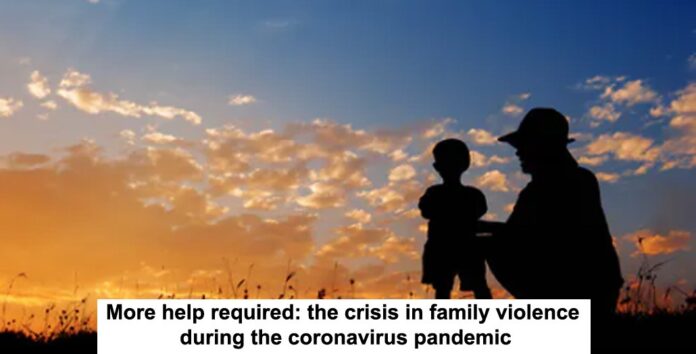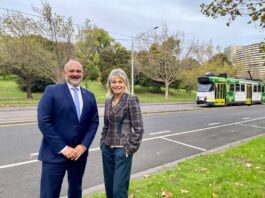Picture: Shuttlestock
Victoria is in the grip of its most severe lockdown since the start of the COVID-19 pandemic.
This means opportunities for victims of family violence to seek help are more limited than ever.
It is essential to closely monitor how the pandemic has exacerbated experiences of family violence and how the restrictions are affecting people’s ability to seek help.
Here we present trend data from three key frontline services to better understand how the current Victorian restrictions have impacted family violence help-seeking behaviours.
Reflecting the limited opportunities to seek help, more women are making use of online chat with 1800RESPECT, while more male perpetrators are seeking behaviour change support.
Risks have risen during the pandemic
Since the COVID-19 pandemic began, significant concerns have emerged about the heightened risk of family and domestic violence for women and children.
In April, the United Nations declared this a “shadow pandemic”. The UN called for governments worldwide to commit more funding to ensure safety from violence during this period.
During the first period of restrictions, our research with practitioners in Victoria and Queensland identified an increase in the frequency and severity of family violence. Practitioners also reported an increase in first-time reports of intimate partner violence and the weaponising of children as part of shared care arrangements.
Practitioners told us perpetrators were using children and the threat of COVID-19 infection to gain access to women, to force them to share a house with their abuser when they previously lived separately, and to control access to children.
Read more: After a deadly month for domestic violence, the message doesn’t appear to be getting through
National research by the Australian Institute of Criminology found one in ten women in a relationship said they had experienced intimate partner violence during the pandemic. Half of those women said the abuse had increased in severity since the outbreak of the pandemic in Australia.
What has changed in lockdown 2.0 in Victoria?
Under stage 4 restrictions implemented across Melbourne on August 2, opportunities for women to help seek are significantly limited. There is a curfew, time outside the house has been limited to one hour of exercise a day within 5 kilometres of home, and only one member of the household is permitted to shop for essential food and household items each day.
While the Victorian government has stipulated seeking help for family violence is a permitted reason to leave the home, our research during the first period of restrictions showed perpetrators used lockdown to further control and isolate their victims.
Since the COVID-19 restrictions began earlier this year, 1800RESPECT, the national helpline, has had an increase in demand for its services nationally. There has also been a shift in how individuals are accessing the helpline.

One of the notable changes compared with the pre-COVID period has been the increased use of the online chat function. Between May and July 2020, Victorians represented 31% of all 1800 webchat. This represents a 30% increase in use compared to the three months prior to May.
The other key change in help-seeking that the 1800RESEPCT data show is the increased volume of calls placed late at night, peaking around midnight.
Read more: See What You Made Me Do: why it’s time to focus on the perpetrator when tackling domestic violence
This may reflect that women are waiting until their children and/or abusive partner are asleep before they seek help. Anecdotally, however, counsellors report that callers at these hours are seeking help to deal with trauma, including nightmares, flashbacks and/or sleep disturbances. It is believed the COVID-19 restrictions are exacerbating experiences of trauma as being confined to their homes triggers victim/survivors’ memories of being or feeling trapped.
The Victorian government has acknowledged the impact of the restrictions on the resurgence of trauma among victims/survivors of family violence. These victims/survivors can be exempt from wearing a mask, for example, where they have previously been choked, strangled or suffocated.
Reports to Victoria Police
Since stage 3 restrictions were reintroduced in Victoria in July, Victoria Police have reported a slight decrease in family violence reports around the state.
This may reflect that the restrictions make it more difficult for victims to report abuse. If living with their abuser, they likely have less time on their own and significantly less time out of the house. The fact that previously separated couples are once more having less in-person contact may also be a factor here.
A clear understanding of police reporting rates and actual experiences of violence will likely emerge over time and will be an important point of analysis.
The current rate of reporting contrasts with the increase in family violence reporting after the easing of the first wave of stage 3 restrictions in Victoria. As people had more in-person contact with family members, Victoria Police found reporting of family violence between separated couples increased to pre-COVID rates.
Engagement with men’s services and behaviour change programs
No to Violence, the peak body for men’s services, reported a spike in requests for services during the initial period of stage 3 restrictions in Victoria.
While calls to the Men’s Referral Service slightly increased as Victoria re-entered stage 3 restrictions, it has not been at the same level as earlier in the pandemic.

Changes in men’s help-seeking have been observed in the Brief Intervention Service (BIS) delivered by No to Violence. The number of men eligible for and enrolling in the intervention has increased. BIS is used to “hold” men who are waiting to enter a program, or who are enrolled in a program that has been suspended during the COVID-19 restrictions.
Men are also eligible for this program when they have called the Men’s Referral Service (MRS) with concerns about their behaviour and how COVID is making it worse.
Sustaining engagement with men who have been identified as using violence is essential to ensure risk is visible and managed during this period of restrictions. The importance of ensuring men’s services can meet increased demand was reocgnised by the Victorian Government this week through the announcement of an additional $20 million in funding to keep perpetrators ‘in full sight’.
Ensuring women’s safety moving forward
The true extent of family violence in the Victorian community during the pandemic will only emerge in the months and years to come.
It is widely acknowledged that crises increase the prevalence and severity of violence against women, but the reporting of this victimisation can lag. The anecdotal trends presented here from frontline services indicate changing patterns in help-seeking behaviours during lockdown. They also point to encouraging signs of men engaging with behaviour change interventions.
We must act now to prevent further family violence and to provide adequate protection to women and children during this period.
Federal and state governments must provide additional resources to keep women and their children safe during home confinement and minimise the potential for escalating violence. This will require increased investment in safe housing and the specialist domestic violence sector, to allow for innovations in remote service delivery.
As we have noted previously, it has also never been more important to invest in the development of supports for the well-being of family violence practitioners. The safety of all families depends on the well-being and continued availability of the frontline practitioners who lead Victoria’s family violence response.
Neighbours, friends and family can also play a critical role in supporting victims and helping them access supports during periods of restrictions. Recognising this, we need to enhance the capacity of bystanders to know what to do and how to help in safe and effective ways.
Securing women and children’s safety during COVID-19 requires a whole-of-community response.
If your well-being is threatened by staying home, you can travel more than 5km and break curfew to find safety. Contact Safe Steps on 1800 015 188 or visit safesteps.org.au for specialist help._
If you believe a friend, family member, neighbour or work colleague is at risk of family violence or you have concerns for their safety contact 1800 RESPECT to speak to a counsellor, or if you believe you are in immediate danger call 000.
This article was co-authored by:
Disclosure statement
Kate Fitz-Gibbon is Director of the Monash Gender and Family Violence Prevention Centre. Kate currently receives funding for family violence related research from the Australian Research Council and Australian Institute of Criminology. She is a member of the Respect Victoria Board of Directors.
Dr Naomi Pfitzner is postdoctoral research fellow with the Monash Gender and Family Violence Prevention Centre.
Jacqui True is Director of the Monash Gender, Peace and Security Centre. She currently receives funding for research on gender-based violence and gender-inclusive peace from the Australian Research Council, the United Nations and the Department of Foreign Affairs and Trade.








